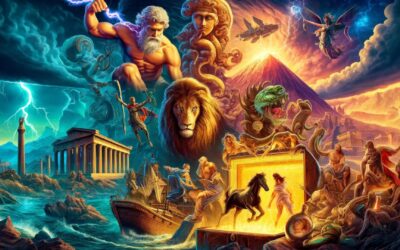Transcript
Disclaimer
I am using an automatic transcript service as it is not possible for me to do it on my own and I cannot afford human transcription at the moment. The service claims to have about 95% accuracy, which means there will still be some mistakes, so my apologies for having a less than perfect transcript, but I hope I can afford human transcription soon and I will solve this problem. However, the service is pretty good, and the transcript is almost perfect.
Transcript
Welcome to a new episode from English plus podcast. Our episode today is about myths and legends and the topic I chose for today, or the character I chose for today is Anubis from Egyptian mythology. So without further ado, let’s start talking about, Anubis. In the early days of ancient Egypt Anubis was the God of the dead later when Osiris took over this role, Anubis became the God who oversaw funerals.
[00:00:36] He was also the guardian of the underworld or land of the dead, where he took the dead to the whole of judgment here. He helped weigh each person’s heart against the feather of truth before presenting the soul to Osiris. Anubis was the son of the goddess Nephthys who had tricked her brother Osiris into fathering her child.
[00:00:58] The goddess’ husband Set hated Osiris and planned to murder the child when he was born Nephthys therefore decided to abandon the infant at birth. She hid him in the marshes by the Nile river, where he was found by ISIS, the wife of Osiris. ISIS raised Anubis and when he reached adulthood, he repaid her by becoming her protector. Later, when Osiris set out to conquer the world Anubis accompanied him. Osiris was murdered by his old enemy Set who tore his body to pieces.
[00:01:34] Anubis helped find the pieces of Osiris’s body and embalmed them or preserved them so well that they never decay. Because of his actions Anubis is said to have performed the first Egyptian burial rights and to have introduced the practice of embalming the dead to Egyptian culture, the Greeks and the Romans also worshiped Anubis whose name is actually the Greek form of the Egyptian name, Anpu. Anubis was frequently merged with the similar Greek God Hermes and given the name Hermanubis.
[00:02:09] Ancient Egyptians were experts at the practice of embalming, which involves preserving the remains of the dead. So they last through the funeral or burial and beyond the Egyptians developed an embalming process known as mummification in which a dead body is wrapped in strips of clothes and dried out for preservation.
[00:02:32] Ancient Egyptians believed that a person’s body was still needed after death, since it transported the soul to the afterlife for this reason, Anubis played a crucial role in the way ancient Egyptians dealt with death and the dead. Anubis is primarily associated with death and the dying images of Anubis depict him as a Jackal, a type of wild dog, or as a man with the head of a Jackal jackals, proud Egyptian cemeteries at night, looking for food and even eating corpses.
[00:03:05] The Egyptians believed that Anubis in the form of a Jackal would keep real jackals away and protect the dead. In this way. Anubis represents a guardian and caretaker for Egyptians after they have died. The images of Anubis appear on many ancient Egyptian tombs. In fact, the distinctive Jackal headed figure is one of the symbols.
[00:03:28] Most commonly identified with ancient Egypt. More recently, Anubis has appeared as a character in the television show Stargate. Now I want you to think about the theme of Anubis and to think about this question, maybe you even want to share, and you can share, of course, your thoughts by going to our website, English plus podcast.com, you will find the link in the description of the episode.
[00:03:52] Take the link, go there, and you can leave a comment to tell us what you think about the question I’m about to ask you now. But before I do, let me remind you also that you can find another link in the description that will take you to our page on Patreon, go to our page on Patreon and become a patron of the show and help us go on because your support is really what we’re counting on to continue the journey of English.
[00:04:14] Plus now, with that being said, let me pose the question to you, even though Anubis is considered a God of death and the guardian of the underworld ancient Egyptians viewed him as a protector and guide. What does this suggest about the ancient Egyptians view of death and the afterlife? How do you think this is different from or similar to modern views on death?
[00:04:36] So there’s an interesting question to you. If you would like to write something about that, if you’d like to share your thoughts, remember you can go to our website. The link is in the description, go to the website, leave a comment, and we will answer all the comments you give regarding this question.
[00:04:51] So with that being said, I would like to thank you very much for listening to another episode from English Plus Podcast. This is your host, Danny. I will see you next time.












0 Comments